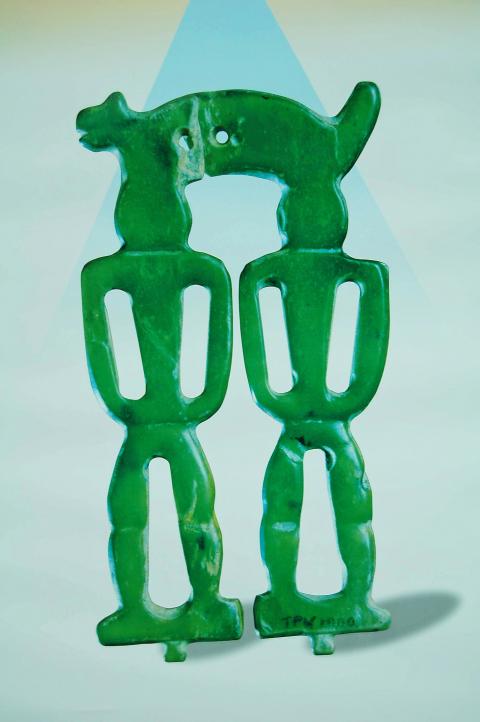David Blundell will give a lecture on Saturday titled “Taiwan roots of the Austronesian Language and Culture,” at the Legislative Yuan, sharing the stage with Democratic Progressive Party (DPP) Legislator Kolas Yotaka, who will discuss the current state of Aboriginal affairs in Taiwan.
Blundell, a professor at National Chengchi University who has been doing anthropological and archaeological research in Taiwan since the early 1980s, will discuss how the majority of Austronesian languages find their origins in Taiwan.
“It’s a history that dates back between 4,500 to 3,500 years,” Blundell told the Taipei Times, when Taiwan’s Aboriginal groups first started to travel to what is today’s Malaysia, Indonesia and the Philippines.

Photo: Huang Ming-tang, Taipei Times
“They weren’t colonists,” Blundell says, “but traders.”
Blundell, who has recently edited Taiwan Since Martial Law: Society, Culture, Politics, Economics and Austronesian Taiwan: Linguistics, History, Ethnology, Prehistory, says that the “Formosans” would trade nephrite jade, grain and pottery to southeast Asia where they would also pass on their languages.
Their languages became incubators for other languages, which Blundell numbers at around 1,200 today, all of which fall under the Austronesian family.
“If the language incubated in Indonesia, it became a different kind of language ... just as European languages became differentiated,” he says, a pattern that repeated itself throughout the region and as far as Madagascar.
Kolas told the Taipei Times through a spokesperson that she will discuss the current land rights issues facing Aborigines.
The lectures will be held at 10am in English at the Legislative Yuan complex, 1 Jinan Rd, Taipei City (台北市濟南路1號). Admission is NT$100 and includes light refreshments.
Attendees must register with Jerome Keating by 10pm tomorrow at: jkeating@ms67.hinet.net.

Google unveiled an artificial intelligence tool Wednesday that its scientists said would help unravel the mysteries of the human genome — and could one day lead to new treatments for diseases. The deep learning model AlphaGenome was hailed by outside researchers as a “breakthrough” that would let scientists study and even simulate the roots of difficult-to-treat genetic diseases. While the first complete map of the human genome in 2003 “gave us the book of life, reading it remained a challenge,” Pushmeet Kohli, vice president of research at Google DeepMind, told journalists. “We have the text,” he said, which is a sequence of

On a harsh winter afternoon last month, 2,000 protesters marched and chanted slogans such as “CCP out” and “Korea for Koreans” in Seoul’s popular Gangnam District. Participants — mostly students — wore caps printed with the Chinese characters for “exterminate communism” (滅共) and held banners reading “Heaven will destroy the Chinese Communist Party” (天滅中共). During the march, Park Jun-young, the leader of the protest organizer “Free University,” a conservative youth movement, who was on a hunger strike, collapsed after delivering a speech in sub-zero temperatures and was later hospitalized. Several protesters shaved their heads at the end of the demonstration. A

In August of 1949 American journalist Darrell Berrigan toured occupied Formosa and on Aug. 13 published “Should We Grab Formosa?” in the Saturday Evening Post. Berrigan, cataloguing the numerous horrors of corruption and looting the occupying Republic of China (ROC) was inflicting on the locals, advocated outright annexation of Taiwan by the US. He contended the islanders would welcome that. Berrigan also observed that the islanders were planning another revolt, and wrote of their “island nationalism.” The US position on Taiwan was well known there, and islanders, he said, had told him of US official statements that Taiwan had not

We have reached the point where, on any given day, it has become shocking if nothing shocking is happening in the news. This is especially true of Taiwan, which is in the crosshairs of the Chinese Communist Party (CCP), uniquely vulnerable to events happening in the US and Japan and where domestic politics has turned toxic and self-destructive. There are big forces at play far beyond our ability to control them. Feelings of helplessness are no joke and can lead to serious health issues. It should come as no surprise that a Strategic Market Research report is predicting a Compound